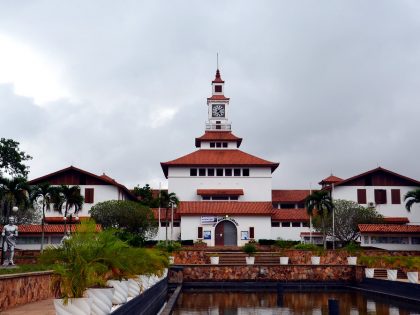
God was everywhere in the street
Renowned Ghanaian highlife musician, Nana Ampadu, died on September 28, 2021. In this interview from 2007, historian Jennifer Hart talks with him about the music that made him famous.

Renowned Ghanaian highlife musician, Nana Ampadu, died on September 28, 2021. In this interview from 2007, historian Jennifer Hart talks with him about the music that made him famous.

The leading African writers and creative artists who are reimagining Christian thought and the several Christian-inspired groups who are transforming religious practice.

Ghana is slowly developing its mental health care to protect human rights. Yet sensationalist journalism, including in the progressive media, continues to portray the treatment of mental health in the country as backward and abusive.

Nkrumah’s written works and speeches reveal a selective encounter and appropriation of tools—in this case from Marxist thought—that were translated through Nkrumah’s traveling theory.

On telling stories through the evocative and varied moments in which humans live, rather than through the predictable and artificial plots historians devise.

COVID-19 exposes the deadly dominance of neoclassical economics in Africa.

Enough of the ignorance: LGBT+ rights are Ghanaian and human rights, not an attempt by Westerners to impose their values or culture.

Kwame Nkrumah’s ideas about pan-Africanism and African liberation inspired many young scholars to explore global linkages around race and power, to uncover historical connections and forge new ones.

How Kwame Nkrumah and Julius Nyerere’s approaches to gender politics, help reshape feminist visions for reclaiming a developmental state.

Lessons on radical politics from a 1970s political-cultural icon. Rawlings also dominated and shaped Ghanaian politics through the 1980s and 1990s.

The history of Africa involves navigating utopian visions and brutal realities as the recent work of Egyptian filmmaker Tamer el-Said's and before that, Ayi Kwei Armah show.

Nkrumah, Nyerere and Senghor were acutely aware of the need to displace the epistemic conditions of colonization in order to transcend it.

How managing COVID-19 and other crises necessitates Africa’s structural transformation, and what we can learn from the early post-independence development projects.

Official Ghanaian pan-Africanism is now less motivated by African liberation and solidarity and more by profit incentives. Ghana’s Year of Return is the best example of this.


Ghana’s ruling party has proposed a new law to control the country’s public universities. The country’s academics are fighting it.

Rather than addressing food scarcity, genetically modified crops may render African farmers and scientists more, not less, reliant on global markets.

Plutôt que de pallier l’insécurité alimentaire, les cultures génétiquement modifiées risquent de rendre les agriculteurs et les scientifiques africains plus, et non moins, dépendants des marchés mondiaux.

When the usual rules no longer hold, like in a pandemic, we might find inspiration in the collectivities and working principles of artists.

The coronavirus shutdown in Ghana exposes the weaknesses and inequities in the country’s education system.